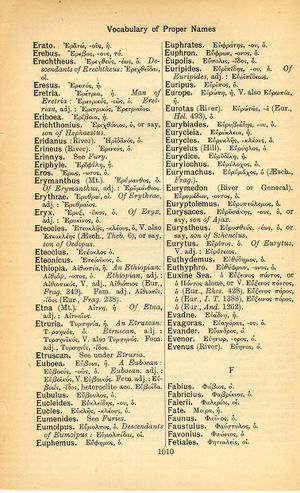Faunus: Difference between revisions
πᾶσα γυνὴ τοῦ λύχνου ἀρθέντος ἡ αὐτή ἐστι → all women are the same in the dark, all women are the same when the lights go out
(Names) |
(6_6) |
||
| Line 1: | Line 1: | ||
{{WoodhouseENELnames | {{WoodhouseENELnames | ||
|Text=[[File:woodhouse_1010.jpg|thumb|link={{filepath:woodhouse_1010.jpg}}]]Φαῦνος, ὁ. | |Text=[[File:woodhouse_1010.jpg|thumb|link={{filepath:woodhouse_1010.jpg}}]]Φαῦνος, ὁ. | ||
}} | |||
{{Lewis | |||
|lshtext=<b>Faunus</b>: i, m. [[faveo]],<br /><b>I</b> a mythic [[son]] of [[Picus]], [[grandson]] of [[Saturn]], and [[father]] of [[Latinus]], [[king]] of [[Latium]]; he instituted [[tillage]] and [[grazing]], and [[after]] [[death]] [[was]] the [[protecting]] [[deity]] of [[agriculture]] and of shepherds, and also a [[giver]] of oracles; [[after]] the [[introduction]] of the [[worship]] of [[Pan]] [[into]] [[Italy]], he [[was]] identified [[with]] [[Pan]], and [[accordingly]] represented, [[like]] the [[latter]], [[with]] horns and goats' feet, Lact. 1, 24; Cic. N. D. 3, 6, 15; Verg. A. 7, 48; 81; Ov. F. 2, 193; 3, 312 sq.; Prop. 4 (5), 2, 34; id. H. 5, 138; Hor. C. 1, 4, 11; 1, 17, 2; 3, 18, 1 et saep. On [[account]] of the [[assimilation]] of [[Faunus]] to [[Pan]], the [[appellation]] Fauni [[was]] also used for Panes, [[sylvan]] deities, Lucr. 4, 581; Ov. M. 6, 392; 1, 193; Hor. Ep. 1, 19, 4; id. A. P. 244; Enn. ap. Cic. Brut. 19, 76 (Ann. v. 222 ed. Vahl.); Cic. N. D. 2, 2, 6; id. Div. 1, 45, 101.—<br /><b>II</b> Derivv.<br /> <b>A</b> Faunĭus, a, um, adj., pertaining to [[Faunus]]: [[versus]], Victorinn. p. 2586 P.—<br /> <b>B</b> ‡ Faunālĭa, ium, n., the [[festival]] [[celebrated]] on the nones of [[December]], in [[honor]] of [[Faunus]], acc. to Porphyr. and Acro, Hor. C. 3, 18, 1 and 10. | |||
}} | }} | ||
Revision as of 08:31, 13 August 2017
English > Greek (Woodhouse)
Φαῦνος, ὁ.
Latin > English (Lewis & Short)
Faunus: i, m. faveo,
I a mythic son of Picus, grandson of Saturn, and father of Latinus, king of Latium; he instituted tillage and grazing, and after death was the protecting deity of agriculture and of shepherds, and also a giver of oracles; after the introduction of the worship of Pan into Italy, he was identified with Pan, and accordingly represented, like the latter, with horns and goats' feet, Lact. 1, 24; Cic. N. D. 3, 6, 15; Verg. A. 7, 48; 81; Ov. F. 2, 193; 3, 312 sq.; Prop. 4 (5), 2, 34; id. H. 5, 138; Hor. C. 1, 4, 11; 1, 17, 2; 3, 18, 1 et saep. On account of the assimilation of Faunus to Pan, the appellation Fauni was also used for Panes, sylvan deities, Lucr. 4, 581; Ov. M. 6, 392; 1, 193; Hor. Ep. 1, 19, 4; id. A. P. 244; Enn. ap. Cic. Brut. 19, 76 (Ann. v. 222 ed. Vahl.); Cic. N. D. 2, 2, 6; id. Div. 1, 45, 101.—
II Derivv.
A Faunĭus, a, um, adj., pertaining to Faunus: versus, Victorinn. p. 2586 P.—
B ‡ Faunālĭa, ium, n., the festival celebrated on the nones of December, in honor of Faunus, acc. to Porphyr. and Acro, Hor. C. 3, 18, 1 and 10.

